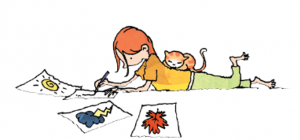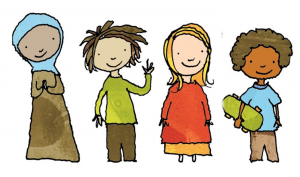Children and Young People’s Program
Seasons for Growth offers children and young people a safe space to come together, and share their experiences of change and loss.
The Children and Young People’s Program has a safe and engaging curriculum structure that incorporates a wide range of age-appropriate activities involving drawing, role-play, stories, discussion, playdough, music and journal activities.
There are four different levels of the program. Each level includes eight weekly sessions, a final celebration session and two subsequent reconnector sessions (that range from 40 minutes to an hour depending on age). Each weekly session explores a concept theme such as, Life is like the Seasons, Change is Part of Life, ‘Valuing My Story, Caring for my Feelings, Making Good Choices.
All four levels of the program have flexibility to cater for participants with different learning needs or preferences. The learning processes reflect a deep respect for children’s capacity to cope, problem-solve, make good choices, set realistic goals and connect with others. Such learning develops best in supportive social contexts with peers and a caring, skilled adult ‘Companion’. Children’s learning is documented in a personal ‘Seasons for Growth’ journal so that participants can re-visit their insights in the future.
Psychology & education working together: psychoeducation
Psychoeducation is not a type of therapy, but rather a specific form of education which helps people learn more about specific events and circumstances that may have occurred in their lives, and the potential range of ways that people respond to them. Seasons for Growth programs help people understand the experiences of change, loss and grief and how these can impact on a person’s life. The programs also support the development of communication, decision making and problem solving skills.
Peer Support
The Seasons for Growth programs are peer based. Peer support is the social, instrumental or emotional support that those sharing life challenges or circumstances can provide to each other in reciprocal fashion. This support can be provided in formal or informal contexts.
Why peer support?
People can be healed by finding affiliation within an equal relationship with someone who has had a similar life experience Helping someone can be self-healing People can gain hope that change is possible through a process underscored by mutual sharing of their lived experience.
Person centred learning approach
Seasons for Growth programs use a person centred learning approach. This approach doesn’t use specific group processes or position the facilitator (Companion) as the expert, but instead aims to create an environment where participants become aware of their own strengths and resources, and decide on their own solutions. Companions model empathy, understanding and acceptance in the group in order to empower participants to be true partners in learning.
Developmentally appropriate activities
The Seasons for Growth Children and Young People’s Program offers four age appropriate levels for children and young people. This ensures that participants are taking part in a tailored, developmentally appropriate sequence of activities and discussions with like-age peers.
Protective and risk factors in mental health and wellbeing
Research has shown that increasing protective factors, and minimising risk factors (or taking steps to minimise their impact) can promote mental health and wellbeing in children and adults.
Seasons for Growth programs help strengthen the building of personal resilience, coping and social skills, and increasing participants’ sense of belonging; while also working to minimise risk factors including social isolation and lack of support networks.
Seasons for Growth programs are recognised as mental health promotion and prevention initiatives, and any participants requiring further support or intervention are referred by the facilitator to an appropriate source of assistance.
You can train to facilitate Seasons for Growth groups to support the needs and priorities of the children and young people in your school or organisation.
Program Outline
The Seasons for Growth Children and Young People’s Program, and Adult Program are small group programs (4-7 participants) delivered over 4-8 sessions. Each participant receives a journal to complete throughout the program. The topics covered in each session of the program include:
- Seasons and Change (autumn)
- My story and grief reactions (winter)
- Feelings and memories (spring)
- Choices and moving forward (summer)

As the name ‘Seasons for Growth’ implies, the different seasons of the year provide a rich symbolic framework in which to explore issues of change and loss. Drawing on the wide variation in the seasons, both in Australia and elsewhere, the metaphor speaks to the ‘ups and downs’ of life, reflecting both the competence and vulnerability of children, as well as the unique ways different ‘seasons’ in life are experienced.
The four seasons are each linked to one of J William Worden’s four tasks of grief (3rd edition, 2009). Worden’s ‘task’ theory was originally developed to help understand bereavement. The Seasons for Growth program adapts these ‘tasks’ to help address other change and loss experiences, too.

